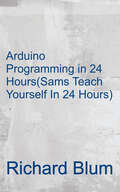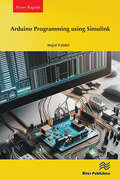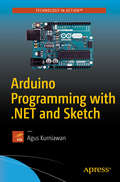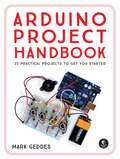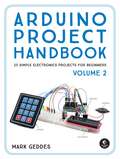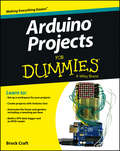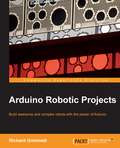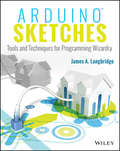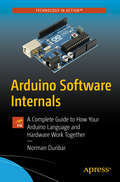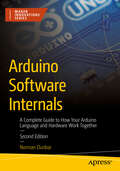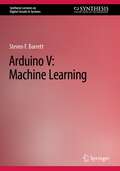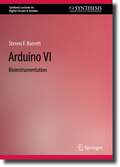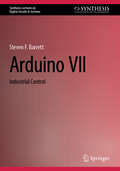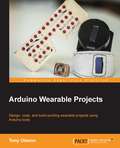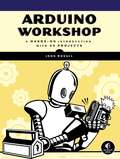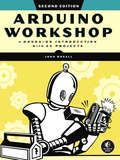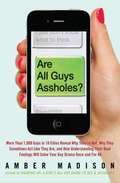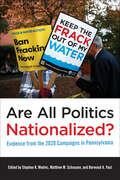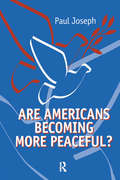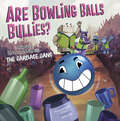- Table View
- List View
Arduino Programming In 24 Hours, Sams Teach Yourself
by Richard BlumIn just 24 sessions of one hour or less, Sams Teach Yourself Arduino Programming in 24 Hours teaches you C programmingon Arduino, so you can start creating inspired “DIY” hardwareprojects of your own! Using this book’s straightforward, step-by-stepapproach, you’ll walk through everything from setting up yourprogramming environment to mastering C syntax and features, interfacing your Arduino to performing full-fledged prototyping.Every hands-on lesson and example builds on what you’ve alreadylearned, giving you a rock-solid foundation for real-world success!
Arduino Programming using Simulink
by Majid PakdelUnlock the full potential of your Arduino projects with this comprehensive guide to integrating Simulink for advanced controller design. Whether you are a beginner or an experienced engineer, this book provides step-by-step instructions on how to design, simulate, and deploy sophisticated control systems using the powerful combination of Simulink and Arduino.Through practical examples and clear explanations, you will learn how to: Design complex controllers using Simulink’s intuitive graphical environment Generate efficient C code from Simulink models and seamlessly upload it to Arduino Ideal for engineers, hobbyists, and students, this book bridges the gap between software and hardware, empowering you to build reliable, real-time embedded systems for a wide range of applications.With its hands-on approach, Arduino Programming using Simulink makes it easier than ever to bring your ideas to life by combining the flexibility of Simulink with the versatility of Arduino.
Arduino Programming with .NET and Sketch
by Agus KurniawanLeverage .NET and Sketch in your Arduino development implementation and integrate it into your .NET program.<P><P> There are many Arduino models and compatible shields that can be used in Arduino boards. Integrating between an Arduino platform and .NET technology or Sketch can produce more advantages. Arduino Programming using .NET and Sketch shows readers how to do so with practical Arduino projects, such as preparing a development environment, performing sensing and actuating with external devices, implementing Windows Remote Arduino and building a simple IoT program.<P> Use this quick reference to learn the basics of the Arduino platform for multiple models and start your Arduino programming in .NET and Sketch today.<P> What You'll Learn:<P> Learn the basics of the Arduino platform; Prepare and set up an Arduino development environment; Develop an Arduino program using .NET and Sketch; Implement Windows Remote Arduino Build a simple IoT program<P> Who This Book Is For:<P> .NET and Sketch developers who want to learn Arduino programming.
Arduino Project Handbook: 25 Practical Projects to Get You Started
by Mark GeddesArduino Project Handbook is a beginner-friendly collection of electronics projects using the low-cost Arduino board. With just a handful of components, an Arduino, and a computer, you’ll learn to build and program everything from light shows to arcade games to an ultrasonic security system.First you’ll get set up with an introduction to the Arduino and valuable advice on tools and components. Then you can work through the book in order or just jump to projects that catch your eye. Each project includes simple instructions, colorful photos and circuit diagrams, and all necessary code.Arduino Project Handbook is a fast and fun way to get started with microcontrollers that’s perfect for beginners, hobbyists, parents, and educators.Uses the Arduino Uno board.
Arduino Project Handbook, Volume 2: 25 Simple Electronics Projects for Beginners
by Mark GeddesThis second volume of the Arduino Project Handbook delivers 25 more beginner-friendly electronics projects. Get up and running with a crash course on the Arduino, and then pick any project that sparks your interest and start making! Each project includes cost and time estimates, simple instructions, colorful photos and circuit diagrams, a troubleshooting section, and the complete code to bring your build to life. With just the Arduino board and a handful of components, you’ll make gadgets like a rainbow light display, noise-level meter, digital piano, GPS speedometer, and fingerprint scanner. This collection of projects is a fast and fun way to get started with microcontrollers that’s perfect for beginners, hobbyists, parents, and educators.25 Step-by-Step ProjectsLED Light BarLight-Activated Night-LightSeven-Segment LED Countdown TimerLED Scrolling MarqueeMood LightRainbow Strip LightNeoPixel CompassArduino PianoAudio LED VisualizerOld-School Analog DialStepper MotorTemperature-Controlled FanUltrasonic Range FinderDigital ThermometerBomb Decoder GameSerial LCD ScreenUltrasonic People CounterNokia 5110 LCD Screen Pong GameOLED BreathalyzerUltrasonic SoakerFingerprint ScannerUltrasonic RobotInternet-Controlled LEDVoice-Controlled LEDGPS SpeedometerUses the Arduino Uno board Praise for the first volume of Arduino Project Handbook:"Easily the best beginner’s guide out there. Pair with an inexpensive clone-based starter kit, and it’s never been cheaper to join the maker revolution."—MakeUseOf.com"Beautifully designed."—Boing Boing
Arduino Projects For Dummies
by Brock CraftDiscover all the amazing things you can do with ArduinoArduino is a programmable circuit board that is being used by everyone from scientists, programmers, and hardware hackers to artists, designers, hobbyists, and engineers in order to add interactivity to objects and projects and experiment with programming and electronics. This easy-to-understand book is an ideal place to start if you are interested in learning more about Arduino's vast capabilities. Featuring an array of cool projects, this Arduino beginner guide walks you through every step of each of the featured projects so that you can acquire a clear understanding of the different aspects of the Arduino board.Introduces Arduino basics to provide you with a solid foundation of understanding before you tackle your first projectFeatures a variety of fun projects that show you how to do everything from automating your garden's watering system to constructing a keypad entry system, installing a tweeting cat flap, building a robot car, and much moreProvides an easy, hands-on approach to learning more about electronics, programming, and interaction design for Makers of all agesArduino Projects For Dummies is your guide to turning everyday electronics and plain old projects into incredible innovations.Get Connected! To find out more about Brock Craft and his recent Arduino creations, visit www.facebook.com/ArduinoProjectsForDummies
Arduino Robotic Projects
by Richard GrimmettThis book is for anyone who has been curious about using Arduino to create robotic projects that were previously the domain of research labs of major universities or defense departments. Some programming background is useful, but if you know how to use a PC, you can, with the aid of the step-by-step instructions in this book, construct complex robotic projects that can roll, walk, swim, or fly.
Arduino Sketches
by James A. LangbridgeMaster programming Arduino with this hands-on guideArduino Sketches is a practical guide to programming the increasingly popular microcontroller that brings gadgets to life. Accessible to tech-lovers at any level, this book provides expert instruction on Arduino programming and hands-on practice to test your skills. You'll find coverage of the various Arduino boards, detailed explanations of each standard library, and guidance on creating libraries from scratch - plus practical examples that demonstrate the everyday use of the skills you're learning. Work on increasingly advanced programming projects, and gain more control as you learn about hardware-specific libraries and how to build your own. Take full advantage of the Arduino API, and learn the tips and tricks that will broaden your skillset.The Arduino development board comes with an embedded processor and sockets that allow you to quickly attach peripherals without tools or solders. It's easy to build, easy to program, and requires no specialized hardware. For the hobbyist, it's a dream come true - especially as the popularity of this open-source project inspires even the major tech companies to develop compatible products. Arduino Sketches is a practical, comprehensive guide to getting the most out of your Arduino setup. You'll learn to:Communicate through Ethernet, WiFi, USB, Firmata, and XbeeFind, import, and update user libraries, and learn to create your ownMaster the Arduino Due, Esplora, Yun, and Robot boards for enhanced communication, signal-sending, and peripheralsPlay audio files, send keystrokes to a computer, control LED and cursor movement, and moreThis book presents the Arduino fundamentals in a way that helps you apply future additions to the Arduino language, providing a great foundation in this rapidly-growing project. If you're looking to explore Arduino programming, Arduino Sketches is the toolbox you need to get started.
Arduino Software Internals: A Complete Guide to How Your Arduino Language and Hardware Work Together
by Norman DunbarIt’s not enough to just build your Arduino projects; it’s time to actually learn how things work! This book will take you through not only how to use the Arduino software and hardware, but more importantly show you how it all works and how the software relates to the hardware.Arduino Software Internals takes a detailed dive into the Arduino environment. We’ll cover the Arduino language, hardware features, and how makers can finally ease themselves away from the hand holding of the Arduino environment and move towards coding in plain AVR C++ and talk to the microcontroller in its native language. What You’ll Learn:How the Arduino Language interfaces with the hardware, as well as how it actually works in C++;How the compilation system works, and how kit can be altered to suit personal requirements;A small amount of AVR Assembly Language;Exactly how to set up and use the various hardware features of the AVR without needing to try and decode the data sheets – which are often bug ridden and unclear;Alternatives to the Arduino IDE which might give them a better workflow;How to build their own Arduino clone from scratch.Who This Book Is For: No expertise is required for this book! All you need is an interest in learning about what you’re making with Arduinos and how they work. This book is also useful for those looking to understand the AVR microcontroller used in the Arduino boards. In other words, all Makers are welcome!
Arduino Software Internals: A Complete Guide to How Your Arduino Language and Hardware Work Together (Maker Innovations Series)
by Norman Dunbar"It's not enough to just build your Arduino projects; it's time to actually learn how things work!" This book goes beyond the basics, providing a comprehensive understanding of Arduino software and hardware, as well as how they intertwine. Gain valuable insights into the inner workings of Arduino and its language, and discover how to communicate with the microcontroller in its native language, AVR C++.Explore the latest version (0.30.0) which offers a multitude of configuration options that can be conveniently modified using the command-line interface (CLI).What You’ll Learn:How the Arduino Language interfaces with the hardware, as well as how it actually works in C++;How to burn bootloaders with the latest version (0.30.0) of Arduino software.How to program your device using an In Circuit System Programmer (ICSP)How to build their own Arduino clone from scratchHow to efficiently handle different boards and libraries Uncover new features and enhancements, including the ability to set up and use profiles, and employ Makefiles.Who This Book Is For: This book welcomes everyone with an interest in learning about Arduino, regardless of expertise. Whether you're a beginner or an experienced Maker, "Arduino Software Internals" equips you with the knowledge to truly comprehend and leverage the power of Arduino.
Arduino V: Machine Learning (Synthesis Lectures on Digital Circuits & Systems)
by Steven F. BarrettThis book is about the Arduino microcontroller and the Arduino concept. The visionary Arduino represented a new innovation in microcontroller hardware in 2005, the concept of open source hardware, making a broad range of computing accessible for all.This book, “Arduino V: AI and Machine Learning,” is an accessible primer on Artificial Intelligence and Machine Learning for those without a deep AI and ML background. The author concentrates on Artificial Intelligence (AI) and Machine Learning (ML) applications for microcontroller–based systems. The intent is to introduce the concepts and allow readers to practice on low cost, accessible Arduino hardware and software. Readers should find this book a starting point, an introduction, to this fascinating field. A number of references are provided for further exploration.
Arduino VI: Bioinstrumentation (Synthesis Lectures on Digital Circuits & Systems)
by Steven F. BarrettThis book is about the Arduino microcontroller and the Arduino concept. The visionary Arduino team represented a new innovation in microcontroller hardware in 2005, the concept of open source hardware, making a broad range of computing accessible for all. This book, “Arduino VI: Bioinstrumentation,” is an accessible primer on bioinstrumentation for those without a deep instrumentation background. An understanding of basic circuit theory is an appropriate prerequisite for the book. The three main goals for the book are: explore accessible Arduino microcontroller programming and interfacing concepts; investigate the source and measurement of biomedical signals; and develop skills to design and implement biomedical instrumentation.
Arduino VII: Industrial Control (Synthesis Lectures on Digital Circuits & Systems)
by Steven F. BarrettThis book is about the Arduino microcontroller and the Arduino concept. The visionary Arduino represented a new innovation in microcontroller hardware in 2005, the concept of open source hardware, making a broad range of computing accessible for all. This book, “Arduino VII: Industrial Control,” is an accessible primer on industrial control and programmable logic controller concepts for those without a deep instrumentation background. An understanding of basic circuit theory is an appropriate prerequisite for the book. The three main goals for the book are: explore accessible Arduino Opta industrial control products; learn the fundamentals of programming using ladder logic; and explore related sensors and interface concepts. We use multiple examples throughout the book and conclude with an instrumented greenhouse project.
Arduino Wearable Projects
by Tony OlssonDesign, code, and build exciting wearable projects using Arduino tools About This Book * Develop an interactive program using sensors and actuators suitable with wearables * Understand wearable programming with the help of hands-on projects * Explore different wearable design processes in the Arduino platform and customize them to fit your individual needs Who This Book Is For This book is intended for readers who are familiar with the Arduino platform and want to learn more about creating wearable projects. No previous experience in wearables is expected, although a basic knowledge of Arduino programming will help. What You Will Learn * Develop a basic understanding of wearable computing * Learn about Arduino and its compatible prototyping platforms suitable for creating wearables * Understand the design process surrounding the creation of wearable objects * Gain insight into the materials suitable for developing wearable projects * Design and create projects including interactive bike gloves, GPRS locator watch, and more using various kinds of electronic components * Discover programming for interactivity * Learn how to connect and interface wearables' with Bluetooth and WiFi * Get your hands dirty with your own personalized designs In Detail The demand for smart wearable technologies is becoming more popular day by day. The Arduino platform was developed keeping wearables, such as watches that track your location or shoes that count the miles you've run, in mind. It is basically an open-source physical computing platform based on a simple microcontroller board and a development environment in which you create the software for the board. If you're interested in designing and creating your own wearables, this is an excellent platform for you. This book provides you with the skills and understanding to create your own wearable projects. The book covers different prototyping boards which are compatible with the Arduino platform and are suitable for creating wearable projects. Each chapter of the book covers a project in which knowledge and skills are introduced gradually, making the book suitable for all kinds of readers. You begin your journey with understanding electronic components, including LEDs and sensors, to get yourself up to scratch and comfortable with different components. You will then gain hands-on experience by creating your very first wearable project, a pair of interactive bike gloves that help you cycle at night. This is followed by a project making your own funky LED glasses and a cool GPS watch. You'll also delve into other projects including creating your own keyless doorlock, wearable NFC tags, a fitness-tracking device, and a WiFi-enabled spark board. The final project is a compilation of the previous concepts used where you make your own smart watch with fitness tracking, internet-based notifications, GPS, and of course time telling. Style and approach This is a project-based book that introduces each project to the reader step-by-step. Each project starts out by covering all the components individually, and then explains how to combine them into interactive objects. Each project contains an easy-to-follow guide to design and implement the electronics into wearable objects.
Arduino Workshop: A Hands-On Introduction with 65 Projects
by John BoxallThe Arduino is a cheap, flexible, open source microcontroller platform designed to make it easy for hobbyists to use electronics in homemade projects. With an almost unlimited range of input and output add-ons, sensors, indicators, displays, motors, and more, the Arduino offers you countless ways to create devices that interact with the world around you.In Arduino Workshop, you'll learn how these add-ons work and how to integrate them into your own projects. You'll start off with an overview of the Arduino system but quickly move on to coverage of various electronic components and concepts. Hands-on projects throughout the book reinforce what you've learned and show you how to apply that knowledge. As your understanding grows, the projects increase in complexity and sophistication.Among the book's 65 projects are useful devices like:– A digital thermometer that charts temperature changes on an LCD–A GPS logger that records data from your travels, which can be displayed on Google Maps– A handy tester that lets you check the voltage of any single-cell battery– A keypad-controlled lock that requires a secret code to openYou'll also learn to build Arduino toys and games like:– An electronic version of the classic six-sided die– A binary quiz game that challenges your number conversion skills– A motorized remote control tank with collision detection to keep it from crashingArduino Workshop will teach you the tricks and design principles of a master craftsman. Whatever your skill level, you'll have fun as you learn to harness the power of the Arduino for your own DIY projects.Uses the Arduino Uno board
Arduino Workshop, 2nd Edition: A Hands-on Introduction with 65 Projects
by John BoxallLong-awaited revision of this best-selling book on the Arduino electronics platform (35,000+ copies sold). Readers gain an in-depth understanding of the Arduino -- beyond just making simple projects.The Arduino is an inexpensive, flexible microcontroller platform that makes it easy for hobbyists to use electronics in DIY projects. With its wide range of input and output add-ons, sensors, indicators, displays, and motors, the Arduino offers you countless ways to create interactive devices. Through 65 hands-on projects, Arduino Workshop will teach you the tricks and design principles of a master craftsman. This edition has been updated for the latest version of the Arduino IDE and revised to reflect current hardware and technology. It includes coverage of general electronics concepts as well as schematic diagrams and detailed images of components. You&’ll experiment with touchscreens and LED displays, explore robotics, use sensors with wireless data links, and control devices remotely with a cell phone. Build projects like: • An electronic version of the classic six-sided die • A GPS logger that records and displays travel data • A keypad-controlled lock that opens with a secret code • A binary quiz game • A motorized remote control car with collision detection Whatever your skill level, you&’re sure to have fun as you learn to harness the power of the Arduino for your own DIY projects. NEW TO THIS EDITION: • A chapter on creating your own Arduino libraries • Updated robotic vehicle projects • Newer shields that leverage GPS, 3G, and LoRa data transmission capabilities • A chapter on MAX7219-based numeric LED displays and LED matrix modules Covers Arduino IDE 2.x
Arduous Tasks
by Lina N InsanaOne of twentieth-century Italy's greatest thinkers, Primo Levi (1919-1987) started reflecting on the Holocaust almost immediately after his return home from the year he survived in Auschwitz. Levi's powerful Holocaust testimonials reveal his preoccupation with processes of translation, in the form of both embedded and book-length renderings of texts relevant to Holocaust survival. In Arduous Tasks, Lina N. Insana demonstrates how translation functions as a metaphor for the transmission of Holocaust testimony and broadens the parameters of survivor testimony. The first book to study Levi and translation, Arduous Tasks overcomes the conventional views of the separation between his own personal memoirs and his translations by stressing the centrality of translation in Levi's entire corpus. Examining not only the testimonial nature of his work, Insana also discusses the transgressive and performative aspects of transmission in his writings. Arduous Tasks is a superb and innovative study on the importance of translation not only to Levi, but also to Holocaust studies in general.
Are African Current Account Deficits Different? Stylized Facts, Transitory Shocks, and Decomposition Analysis
by César Calderón Alberto Chong Luisa ZanforlinA report from the International Monetary Fund.
Are All Guys Assholes?
by Amber MadisonWhat if everything you've been told about guys your entire life has been a lie? And what if your approach to sex, dating, and relationships is completely wrong, because it's based on false assumptions about how men think and feel? The idea that guys are "only interested in one thing," may help comedians, TV executives, and "dating gurus" make money, but it's not the truth. That's right-guys care about more than just sex, they don't have to be coaxed into relationships, and they deeply value emotional connections with women. How do we know? Because sex and dating expert Amber Madison asked them. She grilled more than a thousand guys in ten cities through interviews and surveys. She examined every stage of romantic relationships-from meeting a guy to getting serious with him-in order to find out what men really think, and why they do the things they do. Why do guys stop calling after a few dates? How can you tell if a guy actually likes you? How soon is too soon to have sex? Based on actual research, Are All Guys Assholes teaches you how to decipher and navigate any dating, hookup, or relationship situation. It explains the roots of some seemingly asshole-ish behaviors, and teaches you how to tell the good ones from the assholes once and for all. By the end, you'll never look at guys the same way again. .
Are All Politics Nationalized?: Evidence from the 2020 Campaigns in Pennsylvania
by Stephen K. Medvic, Matthew M. Schousen and Berwood A. YostGiven the news media’s focus on national issues and debates, voters might be expected to make decisions about state and local candidates based on their views of the national parties and presidential candidates. However, nationalization as a concept, and the process by which politics becomes nationalized, are not fully understood. Are All Politics Nationalized? addresses this knowledge gap by looking at the behavior of candidates and the factors that influence voters’ electoral choices. The editors and contributors examine the 2020 elections in six Pennsylvania districts to explore the level of nationalization in campaigns for Congress and state legislature. They also question if politicians are encouraging nationalized behavior and straight ticket voting—especially with down-ballot races. Are All Politics Nationalized? concludes that issues specific to particular districts—such as fracking and local union politics—still matter, and candidates are eager to connect with voters by highlighting their ties to the local community. National politics do trickle down to local races, but races up and down the ballot are still heavily localized.
Are All the Women Still White?: Rethinking Race, Expanding Feminisms (SUNY series in Feminist Criticism and Theory)
by Janell HobsonMore than thirty years have passed since the publication of All the Women are White, All the Blacks are Men, But Some of Us are Brave. Given the growth of women's and gender studies in the last thirty-plus years, this updated and responsive collection expands upon this transformation of consciousness through multiracial feminist perspectives. The contributors here reflect on transnational issues as diverse as intimate partner violence, the prison industrial complex, social media, inclusive pedagogies, transgender identities, and (post) digital futures. This volume provides scholars, activists, and students with critical tools that can help them decenter whiteness and other power structures while repositioning marginalized groups at the center of analysis.
Are Americans Becoming More Peaceful?
by Paul Joseph"It's time that someone broke into the general gloom created by a war-loving administration and reminded us that we are a peace-loving people. Paul Joseph's book does just that, not with fantasy but with facts, showing how the public antipathy to war, suppressed too long by propaganda and deception, is coming to the surface, and offers hope." Howard Zinn "In this antidote to despair, Joseph shows how even the most sophisticated efforts of US political and military leaders to maintain public support for war are flawed and doomed to failure in the face of an increasingly skeptical public that is unwilling to accept the costs." William A. Gamson, Boston College "An original and thought-provoking perspective on one of the most important issues in American politics today." Michael Klare, Hampshire College Are Americans becoming more peaceful -- even after the 2004 elections and the seeming affirmation of the war in Iraq? This book looks at the meaning of peace in the face of war and offers an optimistic interpretation of the public's changing views. US citizens are becoming increasingly uncomfortable with the costs of war that can be measured not just in dollars but in lives and international respect. Americans are becoming ever more resistant to government management of the "facts" surrounding war. In areas ranging from media and photojournalism to gender and casualties, Joseph exposes the reality of popular opposition to war.
Are Asset Price Guarantees Useful for Preventing Sudden Stops?A Quantitative Investigation of the Globalization Hazard-Moral Hazard Tradeoff1
by Ceyhun Bora Durdu Enrique G. MendozaA report from the International Monetary Fund.
Are Bowling Balls Bullies?: Learning About Forces And Motion With The Garbage Gang (The\garbage Gang's Super Science Questions Ser.)
by Thomas Kingsley TroupeThe Garbage Gang builds a bowling alley, and they meet Gordy's bowling ball, Beau. Beau likes to knock down pins, so the gang wonders, "Are bowling balls bullies?" Fortunately, Beau helps them learn all about forces and motion, and soon they discover the answer to their burning question.
Are Business Cycles Different in Asia and Latin America?
by Alexander W. Hoffmaister Jorge E. RoldόsA report from the International Monetary Fund.
